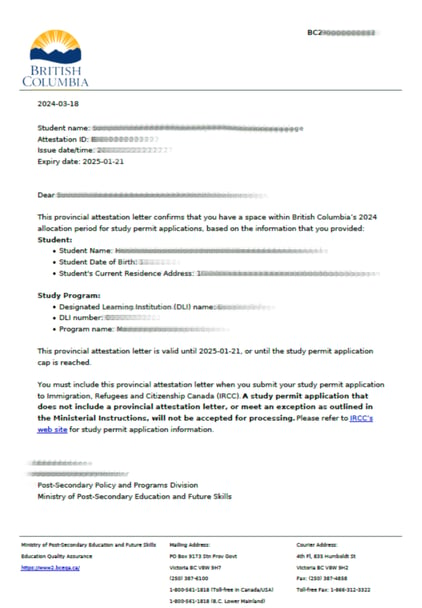Ultimate Guide to Attestation Letter for Student Visa Applicants in Canada (2024)
In 2024, Canada introduced a new requirement for student visa applicants: the provincial attestation letter (PAL) or territorial attestation letter (TAL). This requirement aims to streamline the visa application process and ensure that applicants meet all necessary criteria before studying in Canada. This blog post explains what the attestation letter is, how to apply for it, the conditions associated with it, and its importance in the student visa application process.
Migravo Online consultant - Sampath Bandaranayake
5/8/20242 min read


What is an Attestation Letter?
An attestation letter is an official document issued by a provincial or territorial authority that confirms an applicant's eligibility and readiness to study in Canada. It ensures that the student has been accounted for under a provincial or territorial allocation within the national cap on new international student permits. This letter is essential for most post-secondary study permit applicants and non-degree granting graduate programs.
How to Apply for an Attestation Letter
Applying for an attestation letter involves the following steps:
Contact the Educational Institution: Reach out to the designated learning institution (DLI) where you have been accepted. They will guide you on how to apply for a PAL or TAL.
Gather Required Documents: Prepare the necessary documents, including your letter of acceptance from the DLI, proof of financial stability, and other supporting documents.
Submit the Application: Follow the instructions provided by your educational institution to submit your application for the attestation letter.
Receive the Attestation Letter: Once issued, the PAL/TAL needs to be included in your study permit application.
For students intending to study in Quebec, a Quebec Acceptance Certificate (CAQ) with specific wording can serve as a PAL.
Conditions for Obtaining an Attestation Letter
To obtain an attestation letter, applicants must meet specific conditions:
Acceptance by a Recognized Institution: You must have an official acceptance letter from a designated learning institution in Canada.
Proof of Financial Stability: Demonstrate your ability to cover tuition fees, living expenses, and other costs.
Academic Qualifications: Meet the academic requirements of your chosen program.
Language Proficiency: Provide valid language test scores if applicable.
Certain groups are exempt from needing a PAL/TAL, including primary and secondary school students, master's or doctoral degree students, and in-Canada study permit holders applying for an extension.
Importance of the Attestation Letter
The attestation letter is crucial for several reasons:
Verification of Eligibility: It confirms the applicant's eligibility to study in Canada, ensuring all necessary criteria are met before processing the visa application.
Streamlined Process: By consolidating various pieces of information into a single document, the attestation letter simplifies and expedites the visa application process.
Increased Credibility: Issued by a recognized authority, the attestation letter adds credibility to the visa application, increasing the likelihood of approval.
Enhanced Transparency: It provides clear and concise information about the applicant, reducing the risk of errors or misunderstandings during the visa application process.
Conclusion
The introduction of the attestation letter for student visa applicants in Canada in 2024 is a significant step towards a more efficient and transparent visa application process. By ensuring that all necessary information is accurately documented and verified, the attestation letter benefits both applicants and immigration authorities. International students aspiring to study in Canada should familiarize themselves with this new requirement and follow the necessary steps to obtain their attestation letter, paving the way for a successful and enriching educational experience in Canada.
For more detailed information, visit the official IRCC website and the additional guidelines on study permits (Canada.ca) (Canada.ca) (Canada.ca) (Canada.ca) (Canada.ca).

